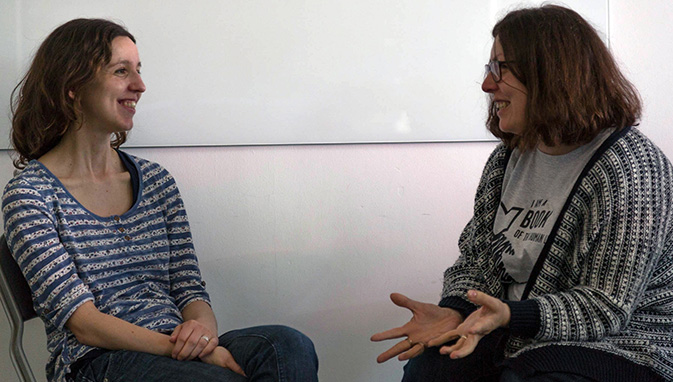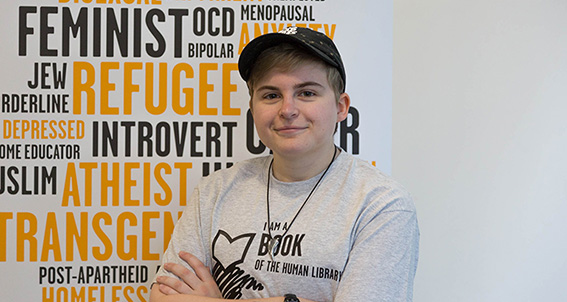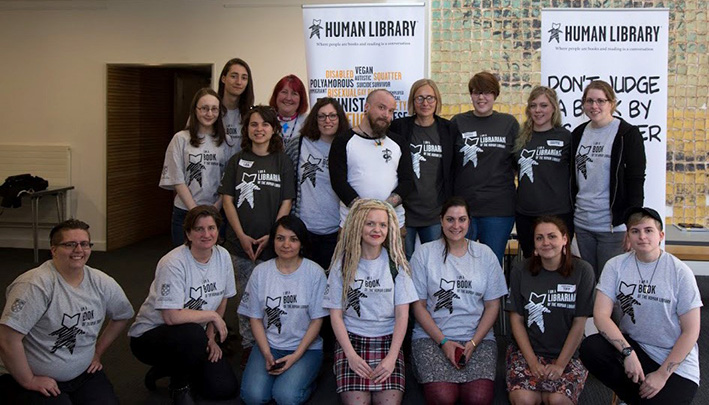Imagine what would happen if you could talk to total strangers about their personal lives. What questions would you want to ask people who you don't normally meet within your social circle? Think of someone very different to yourself - coming from a different ethnic or religious background, leading a lifestyle you don't agree with, or maybe someone who has experienced trauma or mental health issues. What would you like to know if they were willing to open up and answer your direct questions about themselves, discuss their life stories and talk about experiences they've been through?
In this blog post, Olena Waskiewicz, the organiser of the Human Library at the University of Winchester, explains how the Human Library works and how it has the power to change the world.
To me, the Human Library is all about creating a safe and inviting space for dialogue, and bringing people from all walks of life into the conversation.

It's the space where you can ask a Mormon about being a missionary; talk to a Muslim about wearing a headscarf in the UK. Talk to a transgender person about growing up, hormones, surgery and being called names in the street. Hear a story of a refugee and learn about their life in the UK. Discuss mental health issues with someone who is bipolar, depressed or has OCD, and learn first-hand about the struggles they face on day-to-day basis. Talk to an immigrant and find out how they feel seeing the newspaper headlines that vilify them. Find out from a non-binary person how they discovered that this is their identity, and why pronouns matter so much to them.
Ask any questions, but be prepared to get asked questions back, and have your own prejudices challenged.
The idea of the Human Library was first developed in Denmark in 2000, and has since then been active in almost 80 countries across the globe, from Sweden, Poland and the USA to Kazachstan, India and Australia. It's a library where 'books are people, and reading is a conversation'. Visitors to the Human Library can choose from a selection of titles and have a half-hour conversation with a Human Book volunteer.
All questions are allowed, so the reader can delve directly into the Human Books' life experience and the prejudice that they have experienced because of who they are. The titles may relate to racial or ethnic identity, sexuality and gender, religion, occupation, lifestyle, disability and health and life experiences and traumas.
You can watch me explaining the Human Library concept in a minute here.
I can't remember when I first heard about the Human Library concept, but I have always thought it sounded amazing. Then, a year ago, I thought - if I would like to see it happen in Winchester, why not organise it myself? My managers at the University Library were extremely supportive of the idea and so I managed to put the event together in less than a month. We had eight Human Books and the room was buzzing with prejudice-busting conversations!
The feedback from readers was great and everyone said that they would love to see it organised again, so I decided to make it a regular event and open it to the wider community. With the support of senior management, the event was much more widely advertised and we had a balanced audience of students, staff and external visitors. Some of them came from as far as Northampton!
A week ago the Stripe building transformed into a Human Library for a day. The catalogue featured a long list of titles, including Autistic, BDSM, Bisexual, Borderline, Depressed, Feminist, Gay Parent, Home Educator, Hunt Saboteur, Introvert, Immigrant, Non-binary, Mormon, Muslim, OCD, Post-Apartheid, Polyamorous, Priest, Refugee, Transgender and Vegan.
 The most amazing conversations can happen when you get such a diverse range of people into one room. Because we are all meeting in those special circumstances, when normal societal norms of small talk and not asking personal questions are temporarily suspended, people feel safe opening up. At the same time, they know that they can ask very direct questions and really try to understand each other's perspective. There's also always a lot of conversation happening in the background, when Books take each other out in an informal way, which leads to very interesting discussions!
The most amazing conversations can happen when you get such a diverse range of people into one room. Because we are all meeting in those special circumstances, when normal societal norms of small talk and not asking personal questions are temporarily suspended, people feel safe opening up. At the same time, they know that they can ask very direct questions and really try to understand each other's perspective. There's also always a lot of conversation happening in the background, when Books take each other out in an informal way, which leads to very interesting discussions!
''You never leave the conversation the same. They always change you.'' Human Library reader feedback
Video edited by candyapplegrove
It's always a true pleasure and privilege to watch the Human Library event unfold and witness the conversations that are taking place. A huge thank you again to all the amazing volunteers, Human Books and librarians who helped the event run smoothly. It wouldn't be possible without you! Thank you to the University for giving me the freedom to organise it and the creative team at candyapplegrove.co.uk who documented the day. See you all at the next Human Library Winchester!
 "Thank you for another amazing day, I've learned SO much!" Human Book, participated last year and this year
"Thank you for another amazing day, I've learned SO much!" Human Book, participated last year and this year
If you would like to be involved with the Human Library in the future, leave us a comment here or email: humanlibwinch@hotmail.com.
To keep up to date with the recent news about the Human Library Winchester, follow us on social media:
Twitter: @humanlibwinch
Instagram: humanlibrarywinchester/
Facebook: humanlibrarywinchesteruk/
Back to media centre